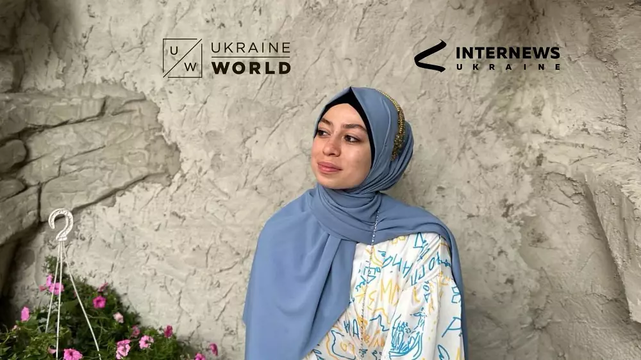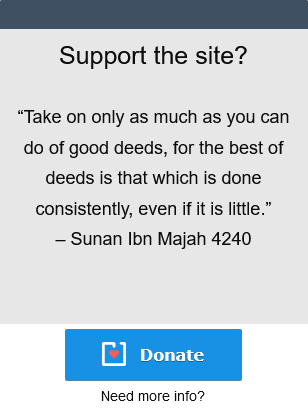Ramadan During Wartime: Insights Into Ukraine's Muslim Community
Aisha Issa, the head of the Ukrainian Muslimahs League, explains how their community comes together to observe Islam's holiest month while helping all.
While we were talking, Aisha found herself realizing that this was the third Ramadan which Ukrainian Muslims had celebrated during the full-scale Russian invasion. This year, the holy month lasts from March 10th to April 9th and is marked by several notable differences in addition to the ongoing war.
Muslims believe that during Ramadan, God's rewards for"good deeds multiply many times over". Thus, some Muslims make plans to carry out acts of charity and goodwill during the holy month. However, Aisha and her organization cannot save their charitable work just for Ramadan anymore.
"Time goes by so fast. With the onset of the war, it became evident that the pace had shifted drastically, making it impossible to view the situation from the same perspective. Thus, we decided to do everything we had planned upon much faster."
This includes feeding the poor, purchasing essential goods for internally displaced Ukrainians, making donations, and other acts of giving.
Moreover, this Ramadan coincided with the new arrival of Ukrainians evacuated from the Gaza Strip, to whom the League is providing aid.
"We are gathering everything for them, from necessities to money. We are working to support them psychologically and morally and to simply create an atmosphere of Ramadan around them, as they are quite frightened. Their evacuation was very harsh, and there is also the war here."
Each day, Aisha makes sure the Gaza evacuees are transported to the mosque so that they can eat and pray together. They include many of her friends and acquaintances. They were able to get out only thanks to their Ukrainian citizenship, and some were able to take their children with them, but their Palestinian spouses were forced to remain behind.
Surrounding these people with care and faith constitutes essential support. It is also what the Ukrainian Muslimahs League has been doing since it was founded.
During these uneasy times, Aisha says, she especially feels how Ramadan has become a period of unity as never before. This extends not only to Muslims, but to all Ukrainians.
Every day, we host iftar at the mosque for the congregation, and we also continue to distribute meals for everyone. Usually, these meals consist of salad, pilaf, bread, and tea. This is a month of good deeds, and we believe in doing even more instead of caring only for ourselves as Muslims.
All are welcome at their mosques, Aisha adds. Knowing that they are doing good deeds and are in the company of brothers and sisters gives them the strength they need to get through the holy month. Though only as far as the war allows.
"In recent days, we have faced constant attacks, which has put a great deal of stress on everyone. Around midnight, the air raid alerts begin, with Shaheds and missiles flying overhead, disturbing our sleep. Very soon after, we have Suhoor that is necessary for us to sustain throughout the day. We are getting practically no sleep at all. All of this has an effect on our bodies and minds."
But it does not compare to what Aisha's religious brothers go through, she says. Many of Ukraine's Muslims are fighting for their country, and do not have the chance to observe the Ramadan fast at all.
Islam allows those who skip Ramadan to 'make up' their fast at a later time, but this, of course, assumes that the people doing so will be able to return to normal life.
Aisha Issa, the head of the Ukrainian Muslimahs League, explains how their community comes together to observe Islam's holiest month while helping all.
While we were talking, Aisha found herself realizing that this was the third Ramadan which Ukrainian Muslims had celebrated during the full-scale Russian invasion. This year, the holy month lasts from March 10th to April 9th and is marked by several notable differences in addition to the ongoing war.
Muslims believe that during Ramadan, God's rewards for"good deeds multiply many times over". Thus, some Muslims make plans to carry out acts of charity and goodwill during the holy month. However, Aisha and her organization cannot save their charitable work just for Ramadan anymore.
"Time goes by so fast. With the onset of the war, it became evident that the pace had shifted drastically, making it impossible to view the situation from the same perspective. Thus, we decided to do everything we had planned upon much faster."
This includes feeding the poor, purchasing essential goods for internally displaced Ukrainians, making donations, and other acts of giving.
Moreover, this Ramadan coincided with the new arrival of Ukrainians evacuated from the Gaza Strip, to whom the League is providing aid.
"We are gathering everything for them, from necessities to money. We are working to support them psychologically and morally and to simply create an atmosphere of Ramadan around them, as they are quite frightened. Their evacuation was very harsh, and there is also the war here."
Each day, Aisha makes sure the Gaza evacuees are transported to the mosque so that they can eat and pray together. They include many of her friends and acquaintances. They were able to get out only thanks to their Ukrainian citizenship, and some were able to take their children with them, but their Palestinian spouses were forced to remain behind.
Surrounding these people with care and faith constitutes essential support. It is also what the Ukrainian Muslimahs League has been doing since it was founded.
During these uneasy times, Aisha says, she especially feels how Ramadan has become a period of unity as never before. This extends not only to Muslims, but to all Ukrainians.
Every day, we host iftar at the mosque for the congregation, and we also continue to distribute meals for everyone. Usually, these meals consist of salad, pilaf, bread, and tea. This is a month of good deeds, and we believe in doing even more instead of caring only for ourselves as Muslims.
All are welcome at their mosques, Aisha adds. Knowing that they are doing good deeds and are in the company of brothers and sisters gives them the strength they need to get through the holy month. Though only as far as the war allows.
"In recent days, we have faced constant attacks, which has put a great deal of stress on everyone. Around midnight, the air raid alerts begin, with Shaheds and missiles flying overhead, disturbing our sleep. Very soon after, we have Suhoor that is necessary for us to sustain throughout the day. We are getting practically no sleep at all. All of this has an effect on our bodies and minds."
But it does not compare to what Aisha's religious brothers go through, she says. Many of Ukraine's Muslims are fighting for their country, and do not have the chance to observe the Ramadan fast at all.
Islam allows those who skip Ramadan to 'make up' their fast at a later time, but this, of course, assumes that the people doing so will be able to return to normal life.
Prilozi
-
842.8 KB Pregleda: 63




